For additional information relating to this article, please contact:
April 30, 2015EMPLOYMENT, EARNINGS AND HOURS, FEBRUARY 2015 Nova Scotians' average weekly earnings (including overtime, seasonally adjusted) decreased $3.98 per week (-0.5%) from January to $831.80 in February 2015. This is 1.9 per cent above the level in February of last year. Canadians' average weekly wages increased 0.3 per cent from January to $951.40 in February 2015, a 2.7 percent increase over February 2014.
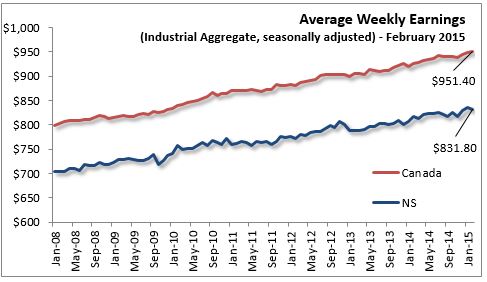
This month, Nova Scotia, Manitoba (-0.2%) Alberta (-0.1%) and BC (-0.1%) showed monthly declines in average weekly wages. On a year-over-year basis, all provinces average wages increased with Newfoundland and Labrador growing the most, at 4.2 percent year over year. On a year to date basis, Newfoundland and Labrador has the highest growth (4.8%), while Quebec has the lowest (2.0%).
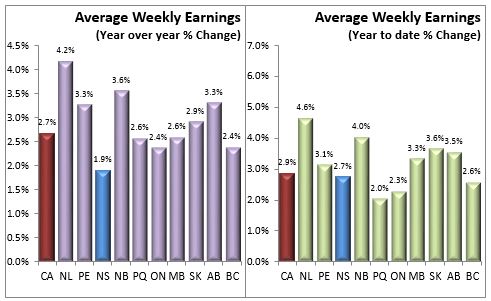
In February 2015, earnings in goods producing industries in Nova Scotia increased 6.5 percent on a month to month basis largely on construction wages, and increased 7.1 percent year-over-year. Service producing industries wages decreased 1.8 percent month to month, and increased 1.0 percent compared to February 2014 (all figures are seasonally adjusted).
On a year to date basis, goods industries' wages were up 3.3 per cent over the first two months of 2015 (compared to the first two months of 2014), and services wages were up 2.8 per cent. Overall, the industrial aggregate increased by 2.7 percent.

WAGE DIFFERENTIALS
Nova Scotia's interprovincial migration flows are highest with the provinces of New Brunswick, Ontario, and Alberta. The following chart illustrates the differences in average weekly wages between Nova Scotia and each of those provinces (Industrial Aggregate excluding unclassified businesses). Over the period of 2001 to 2015, the difference between this province and New Brunswick was $10.30 per week. Ontario's wages were, on average, $120.67 higher per week over the past 15 years, and Alberta's were $196.00 per week higher.

EMPLOYMENT
In February 2015, Nova Scotia had 399,117 payroll employees, a decrease of 0.6 percent compared to last month, which is 0.4 percent lower than a year ago. Canada had 15.7 million employees, level with last month, and 1.4 percent higher than a year ago.
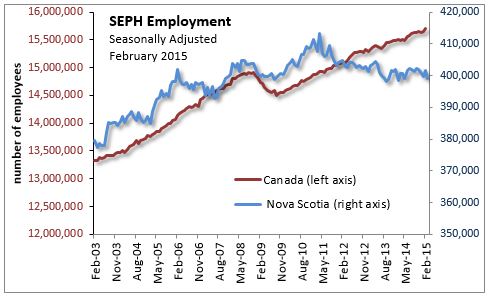
REFERENCE TABLES
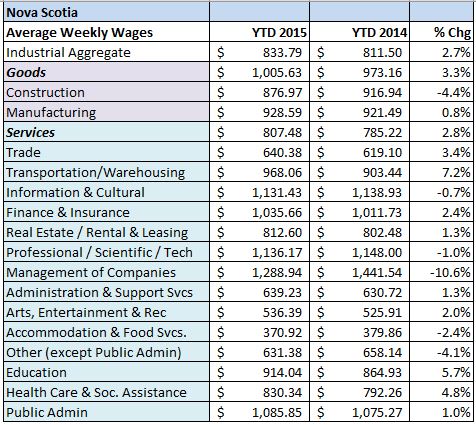
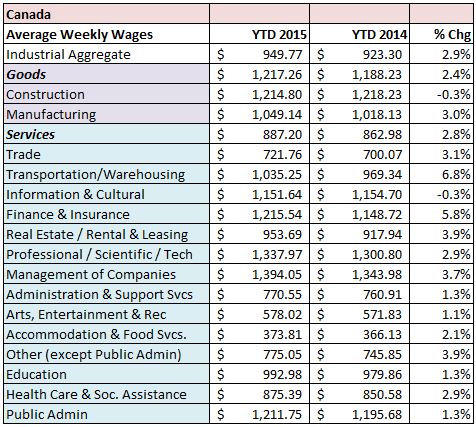
Source: Statistics Canada, Survey of Employment, Payroll, and Hours. CANSIM Table 281-0063